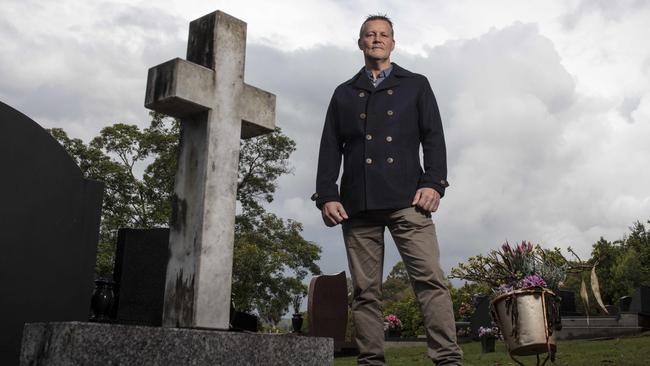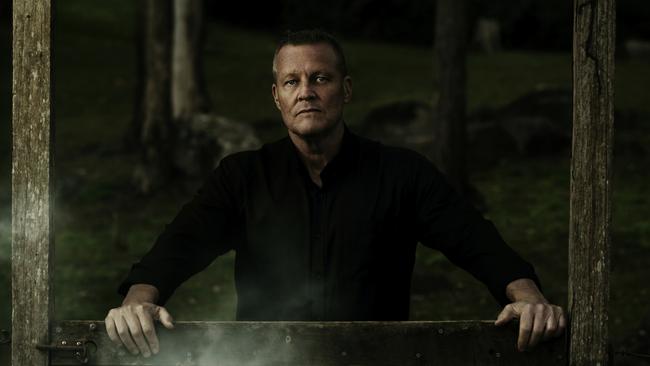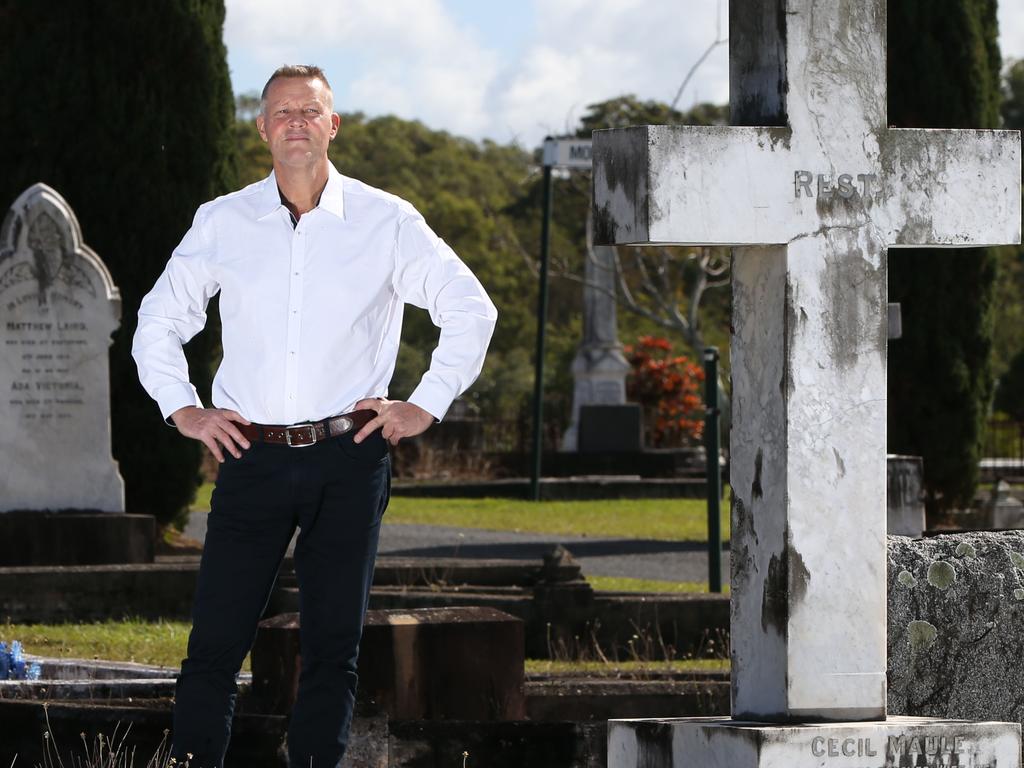Who ya gonna call? Bill Edgar, the Coffin Confessor
Want long-held secrets and uncomfortable home truths revealed at your memorial service? Call the private investigator turned ‘coffin confessor’.

It was a perfect day for a funeral. A bright summer morning on the Gold Coast. In a few hours the heat and humidity would skyrocket, baking the steepled roof until the chapel was oven hot. But for now the weather was on the side of the mourners, who shuffled into the church to pay their respects to the deceased. I filed in with them, sombre, head bowed respectfully while we took our seats, chairs scraping and shoes squeaking.
The ceremony opened with a few words from the priest, a hymn, and then a big fellow seated in the pews stood up and slowly made his way to the lectern. There, he stood for a moment, shuffling the papers he’d prepared for the eulogy. He introduced himself as John, the best friend of Graham, the deceased, and welcomed us to his farewell. John was a big guy – the sort of man who wore an easy smile as he made his way through the world. But his mouth turned down as he cast a sad look towards the coffin. John stared off into the chapel mournfully, took a deep breath, then began to speak. The crowd listened respectfully as he delivered his opening words.
After exactly two minutes had passed, as arranged, I stood, cleared my throat, and reached into my vest pocket to retrieve a letter. “Excuse me, but I’m going to need you to sit down, shut up, or f… off. The man in the box has a few things to say.” Every eye in the room turned to me. But my attention was focused on John. By the way the colour drained from his face, I could tell he knew what this was about. I’ll explain why in a moment, but first we’ll have to go back in time a few months, back to when I first met Graham, the man lying in the coffin. He’d hired me as a private investigator.
Most PI work comes down to money. Love and money – the only two things that get your average person worked up enough to call a PI. Graham’s case involved a little of both. He first engaged me in early 2016 to investigate his finances. Money was being funnelled from his accounts, and I was able to figure out by whom. With enough pressure applied, the money was returned and the case was closed. Sadly, that’s where the good news ended for Graham. At the conclusion of my investigation, he disclosed that he was terminally ill. “I thought I had longer than this,” he told me, as I sat by the bed.
Our conversation led to matters of mortality – death, the afterlife. “I don’t have any idea what’ll go on after I’m gone, or where I’m going to end up, but wouldn’t it be nice to know?”
“Well, let me know once you find out,” I said. “Send some sign from the other side. Let me know if you enjoyed your funeral.”
He shook his head. “I don’t reckon I will. I already know I’m going to hate my funeral.”
Graham told me he didn’t think much of most of the funerals he’d been to. He was always surprised and disappointed because he’d expect to see a true reflection of his loved one – the things that made them unique, that people loved them for. The good and the bad. Instead, he got a sanitised, watered-down picture. He’d even had friends who’d recorded their own video eulogies, only for their message to be considered inappropriate. Instead, the service ran a slide show of photos from their life.
Graham mentioned that he’d like to write his own eulogy. “Why don’t you do that?” I said. “Film a video and get them to run it at the service.”
“I know they would never run it. Someone would decide it was too confronting for my family and friends, and they’d be afraid of insulting those left behind. There’s no point.”
“I could always do it for you,” I joked. “Crash your funeral and deliver the eulogy you really want.”
We had a laugh about it, shook hands and said goodbye. I didn’t give it another thought. But a few weeks later I received a call from Graham. “I’ve been thinking,” he said. “I’m going to take you up on that offer. I want you to crash my funeral. Interrupt the service and read out the message I’m going to write for you.”
“Are you serious?”
“Dead serious. And I’m going to pay you 10 grand to do it. There’s a lot I want to say. You see, there’s something I want revealed at my funeral. My best mate, John, is insisting on giving the eulogy.”
“So? What’s wrong with that?”
It turned out that Graham had an important bit ofpersonalbusiness to settle before he could rest in peace. John, his best mate of many years, had been trying to crack on to his wife. Even though she hated the bloke! At first she didn’t tell Graham, because she didn’t want to upset him, but in the end she didn’t know what else to do about it. But once she told him, Graham didn’t know what to do about it either.
Graham had worked hard, paid his way, done all the right things in life. But now here he was, sick and dying, unable to deal with this betrayal directly. So he wanted me to interrupt the service and put John to rights in front of all the people they knew, something Graham didn’t have the strength to do anymore. “I feel weak,” he confessed. “I hate it, being so helpless. I’m ashamed that I can’t do anything about it.”
“You’re on,” I told Graham. “I’ll crash your funeral service and tell him how it’s going to be.”
“Do you think that’s out of line?”
“It’s up to you,” I said. “It’s your funeral.”
Experience has taught me not to trust anyone or anything until I have evidence – and there’s always a way to get that. With Graham’s permission, I set up a hidden camera inside his home.
By the next evening, I had all the proof I needed. Pretty much the second John thought he was alone with Graham’s wife, he was moving in on her. He’d try to grab her in the hallway as she passed and she’d have to push him away. Real sleazy ’80s-movie bullshit. What a wanker. Not long after that, Graham passed away. By then, everything had been settled.
He had instructed me to interrupt his best mate’s speech no less than two minutes in, so that was when I got to my feet and made my introduction. “My name’s Bill Edgar and I’m here on behalf of the deceased, who has a message for you all.”
I unfolded Graham’s final message and read aloud. “John, I’ve hired Bill to interrupt your eulogy to tell you that I witnessed you, on several occasions, trying to screw my wife. God love her, she rejected every one of your advances. But that doesn’t change the fact that a mate does not do that. Especially when one is lying on his deathbed. I hate you for what you did, and what you were trying to do. My final wish is that you f..k off from here. You’re not welcome at my funeral, and you’re certainly not going to speak on my behalf.”
I looked up from the letter. John had dropped his notes – I heard them fall to the floor in the hushed room. He was gripping the sides of the lectern and his face had turned a really funny colour. He must have been paler than my poor client in the box. Before I was done, the dude lost his nerve and left. A few others in the congregation tried to object, telling me to sit down, but I calmly told them the man in the box had more to say.
“Further, if my brother, his wife and their daughter are here, you can kindly f..k off too. I haven’t seen you in 30 years, and now you show up to pay your respects? You never respected me in life, so why should you respect me now? Where were you when I was alive and could have used you around in the hard times? This funeral is for my loved ones, who I will miss dearly, and for my wife, who I loved until my last breath. I love you still.”
With that, I folded up the letter, put it back in the envelope and walked up to the casket, where I laid it gently on the wood. There was still not a sound in the church as I walked back down the aisle, my footsteps ringing out behind me until I reached the double doors. I was on my way to my car when a young woman called out to me. She caught up with me and introduced herself as Graham’s daughter. She thanked me for what I’d done. “Dad would have loved that,” she said. “And Mum loved it too.”

When Graham asked me to crash his funeral, ithad seemed like a one-of-a-kind sort of request. So a week later, when I received a message from a lady who’d been there asking me to visit her aunt Christine who was dying, it got me thinking that maybe there was something here. Maybe this was something people needed – a way to reclaim some agency over how our deaths are marked, the way we’re remembered. I decided I needed a name for this kind of work. The service I would provide to the dying was granting them one last wish, a way for the powerless to leave the world with their conscience clear and the slate wiped clean. A confession before the coffin. The Coffin Confessor.
Generally I try to fulfil any request. I figure if it’s a client’s last wish in the world, it’s gotta be important to them. So if it’s not illegal, and it’s not going to hurt anyone, I’ll do what I can. I do my due diligence to determine if they’re telling the truth, but they always are.
In late 2018, I got a call from a woman in northern NSW. She said she was a carer for a gentleman at the end of his life and she’d heard about me from one of the mourners at Christine’s funeral, where I had confessed Christine’s love for her best friend. The woman said she had a patient, Rod, who had been very sick for a long time. He had certain regrets, she’d told me, including one or two major things he wanted to put right.
“All right,” I said. “I can help with that.”
My new client Rod was a sworn, colour-wearing, Harley-riding member of the Gold Coast chapter of the Hunters Motorcycle Club. These days he was living in exile out the back of a small town in northern NSW, the best days of his life in the rear-view mirror. Rod was an intimidating-looking bloke up close, a proper biker, with tattoos snaking up his arms and creeping up his neck from under his shirt. He had chunky silver rings on all his fingers, a big chain around his neck, scars on his knuckles.
He was almost dead, he told me. Cancer. He told me he wanted to be buried with his Harley, and he wanted to hire someone he could trust to make sure that happened. I assured him I could.
I asked him what else there was. “So,” he said. “I’m gay.” He wanted me to interrupt his funeral service and reveal to his friends and associates that he was bisexual and had enjoyed many flings with women over the years, but his preferences had leaned more towards men his whole adult life. In his final years he had enjoyed one intense, loving relationship with a man, but had never found a way to tell his brothers in the motorcycle club. This was his main request: that I crash a funeral full of grieving and possibly heavily armed bikers and tell them that the bloke they were putting in the ground had been secretly gay his whole life.
“Yeah mate,” I said. “No problem, I can do that.” I told him how much it would cost, and also told him what I wasn’t willing to do – he had a long list of demands and grievances he wanted settled.
Rod passed away not long after our meeting. The funeral was actually quite fun, if a little intimidating. His whole chapter was there, as well as blokes from other chapters who’d come to pay their respects. I waited until the proceedings began, then gently made my way to the front of the crowd and introduced myself. “Excuse me. My name’s Bill Edgar and I’m the Coffin Confessor. What you’re about to hear comes from your friend and associate, Rod, who has asked me to read this on his behalf.” I reached into my vest and retrieved the letter Rod had given me. “Hi, dickheads. I’m dead and you’re all still here. Make sure you enjoy what time you have left. Death is a f..king scary adventure. I embraced it – had to really. I don’t have much of a choice now, do I?
“Now that I’m gone, I’ve got something to tell you. As some of you might have known deep down, or suspected: I was bisexual. I was in love with a man, and that man stands amongst you right now.”
I looked up – there was a bit of an uproar. Some of the assembled were shocked, others weren’t that happy. There was no way but forward, so I kept reading. “I know you’re all looking around trying to figure out who he is. You’re not going to ever know unless he tells you. But I want him to know I loved him with everything I had. No, it’s not David, who right now is probably standing up the back laughing and looking around. You can all stop looking at David.
“To those who cared for me, I love you guys. To those that didn’t, I’ll see you in hell. It’s time for me to visit past family and friends, so live well, ride safe, and be true to yourself. That’s something I wasn’t, but wished I was. Remember me by remembering to live with no regrets.”
And that was that. It felt like Rod had got one last hurrah after his death. His message was important – for him, finally able to come out of the closet, but also for the mourners. At the end of the service, as per Rod’s request, we buried him with his bike – a beautiful 1200cc Harley Davidson Fat Boy. After that, I was gone.
Edited extract from The Coffin Confessor, A True Story of Life, Death and Every Secret In Between by Bill Edgar (Penguin Books $34.99), out now.


To join the conversation, please log in. Don't have an account? Register
Join the conversation, you are commenting as Logout